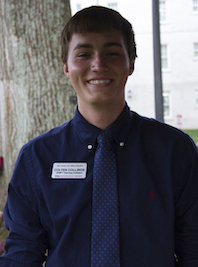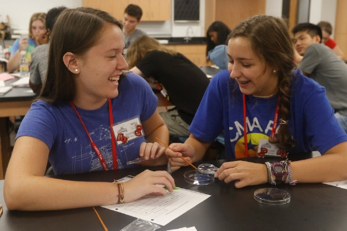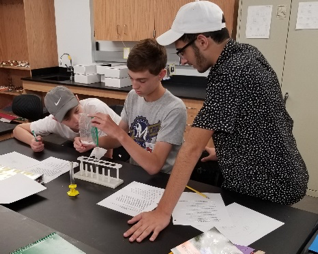
by Colten Collings
Our class is all about the DNA and genetics of living things, and boy, do we have some live ones in class — students, flies, and termites alike! This three-week adventure has been a great one. We began our class posing the question, “Why are we who we are?” Our students, as expected, answered, “DNA.” That is certainly part of the answer! However, throughout the class we have investigated more about what exactly deoxyribonucleic acid (DNA) is and how it manifests to make us who we are. Students completed two DNA extractions, one with a strawberry and one with their own cells. If you catch your child extracting DNA with household supplies, it wasn’t us who taught that!
Students soon realized that it is our transcribed and translated DNA (e.g. protein) that makes us different than those around us. However, some of us

are even more — we’re mutated! All of us carry mutations (mistakes) in our DNA, but only some of these mistakes are able to persist. Our students investigated mutations, found in fruit flies and in humans. Some of these flies had legs growing from their head and others were without wings. Students also used a karyotype of a diseased patient and identified mutations. Students then researched cancer and how its mutations in your own cells cause such a problem.
In week two, students begin to use their knowledge of DNA and genetics to investigate crimes, using real investigation techniques such as gel electrophoresis to determine who was the most likely to commit such horrendous acts. To complement their investigations, we traveled to a state crime lab in Frankfort and ventured through the facility, learning about the technology and even watching people collect evidence to be used in real cases.
In our final week we have explored biotechnology, including DNA sequencing techniques, CRISPR/Cas9, and Chaney’s Dairy Barn’s robots. Genetically modified organisms (GMOs) continue to be a hot topic in the community, and our students are investigating this issue. Through the book they’ve read, the videos they’ve watched, and the research they’ve completed, our students are able to share with us a special angle on GMOs and develop an informed opinion. Tomorrow students will present their research. I’m excited to hear what they have to say!

